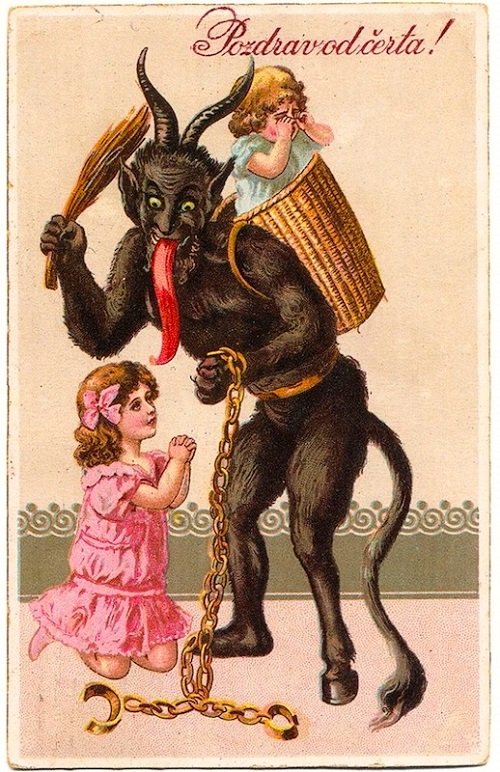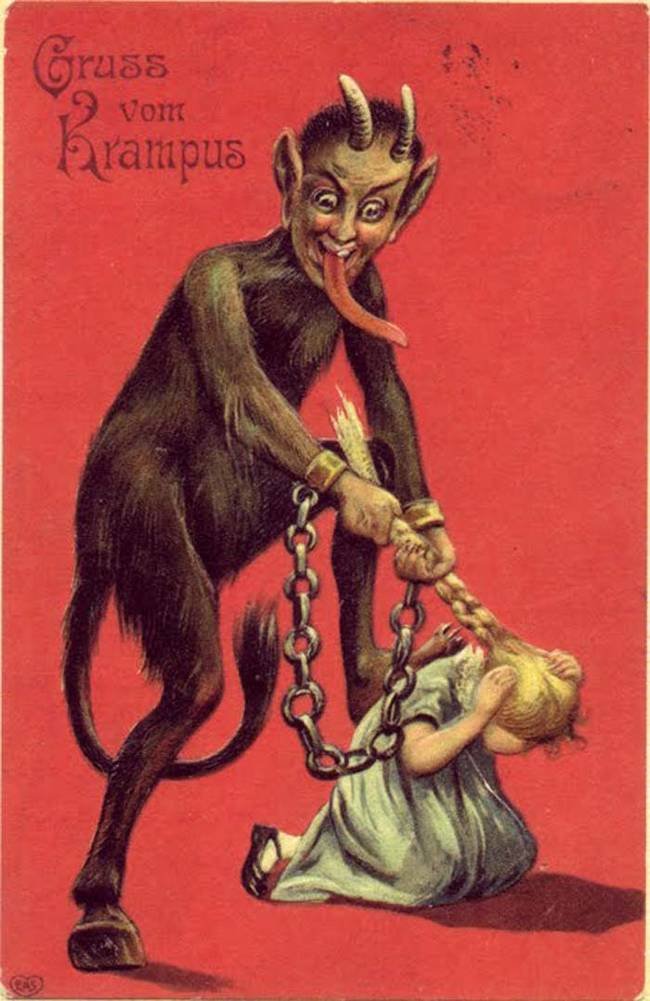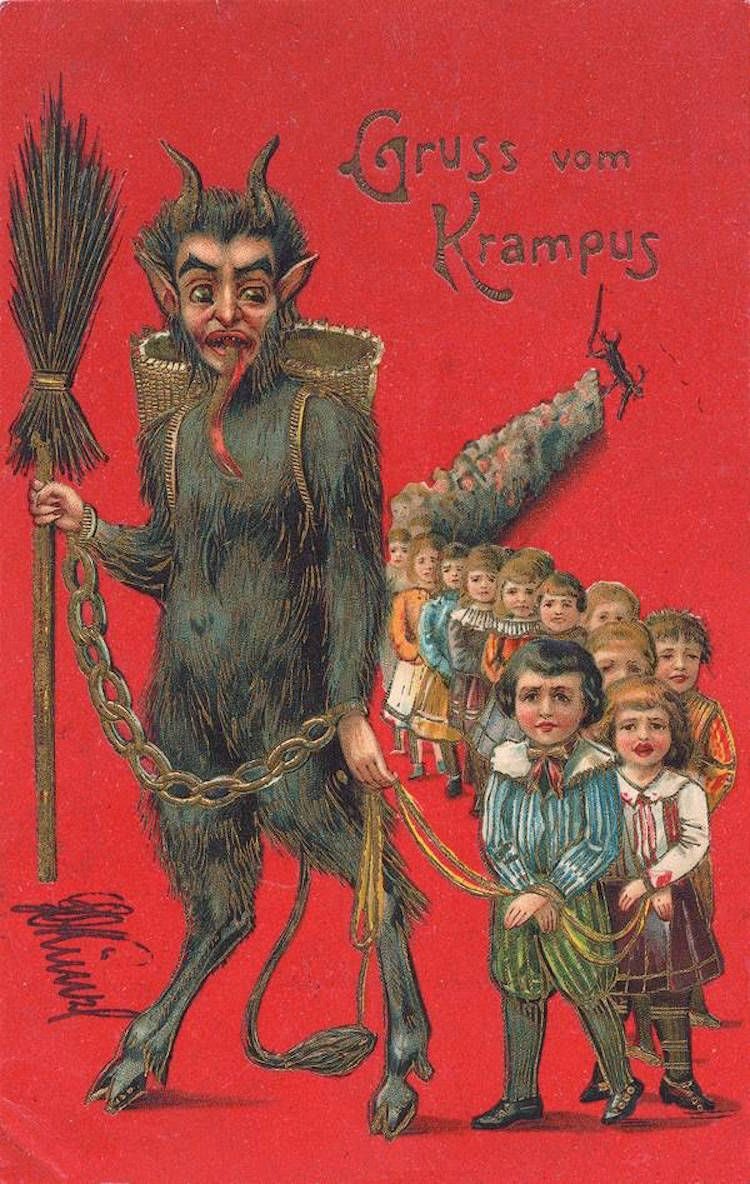Last night I received a Krampus greeting from a good friend. I appreciated it, particularly since the Krampus has barely any presence in her culture. It reminded me that it was St. Nicholas' Eve, and I was thinking I should probably polish my shoes.

Shoes? St. Nicholas? Krampus???
For all those who are not familiar with the central European tradition of St. Nicholas, here's a quick run-down: On the evening of December 5th kids clean their boots eagerly, and set them outside their front door. The next morning they come to find chocolate and candy (or ideally walnuts and oranges) in their shoes if they were good. Otherwise, naughty kids get a bunch of rods (like thin birch branches), a gift from the Krampus that could be used to give them a beating. (OUCH!!) In practice, however, kids would get both, that is a bunch of rods decorated with candy, and no actual beating would take place. Parents would only remind them that they have been pretty good overall, but apparently still far from perfect.
However, during all my years in Germany I never once got to see a Krampus. Unlike the Nikolaus (Santa Claus), who would visit us in school, sometimes even at home, as well as in shopping centers, or any other possible occasion, the Krampus nowadays has gone out of fashion, so hardly anyone even mentions it any more.

image source
Instead, there is the figure of Knecht Ruprecht, which is sort of a servant (as not to say slave) to St. Nikolaus. Quite appropriately, Bart Simpson's dog is also called Knecht Ruprecht in the German dub. Being Santa's helper, Knecht Ruprecht is sort of like a grumpy old man (probably the same age as Santa), but while the other guy is jolly and fun, he is kinda the opposite, always grumbling about everything. But that's quite understandable. After all, he is tasked with all the grunt work and heavy lifting, without getting any appreciation for it, ever. But at least he does not hurt the kids, unlike the Krampus.
Santa's Demon Assistant
Things were quite different before my family moved to Germany. Being a kindergarten kid in Hungary, I remember being visited by both the Mikulás, as we called Saint Nicholas, and the Krampus, a black, furry character with a long tongue and horns, who would chase us around, until Santa told him to cut it out and leave. By that time, however, lots of tears had been shed, and many kids were seriously terrified.

image source
I remember once talking to a little friend of mine, where she was hiding under the table crying, trying to comfort her. She was seriously worried that the Krapus would do the things he never actually did, but all of us had heard about: She explained that the Krapus would catch her, stuff her into a sack head first, with her legs hanging out. Then he would pull her pants down, and beat her naked butt with the rods in front of everyone. I told her that he never really did that, and even then, only to the bad kids, and besides, he is not even real, but my poor friend remained unconvinced. I really felt sorry for her. Obviously someone (her parents?) had made her truly believe these things.

image source
This made me think quite a lot, maybe not right away, but over the years. What a horrible thing it is to tell kids such terrifying things, and more than that, letting them believe they're true? My own parents told me the same things too, but they always added that these are just stories to get children to behave. So from a very early age I did not believe either in Santa, or the Krampus, or Knecht Ruprecht, or the Christchild, or even God. However, I always enjoyed the stories, and I felt sorry for people who could not fully appreciate them because of actual fear. So sad, such a loss!

image source
The Significance of the Krampus For All Of Us
After this little introduction of weird customs from past times and strange cultures, I would like to mention some aspect of this tradition that I believe is quite important for us right now. Whether it's Santa Claus, the Krampus, God, or Big Brother, lots of time we are made to believe in some all-seeing entity that would later on punish us for being naughty. The eye in the sky (or in your apps) will know if you criticized the government, questioned the vaccination policies, spoke out against the war, or did anything else that the powers that be don't like. As a punishment your bank may refuse to give you access to your money.

image source
But Wait!
Please don't believe these scare tactics! This is precisely the point I was trying to make: Do not be afraid, ever! Instead speak out for or against what you truly believe you should, and then let the Krampus come! See if he's still so big and bad, when all the kids refuse to be scared! In the end, it is usually a guy dressed up in a costume, that's all.


I finally got the time to read this.
It's quite the analogy, it makes me think of religion, we are coerced to do this or that because of the all seeing god would punish us and send us to hell or whatever.
That says a lot about humankind, people is only good because of the promise of a reward in the shape of eternal salvation, and the menace of a punishment
Right, that's what it would seem like, wouldn't it? That we only do good things because we want to get the reward or avoid the punishment. But honestly, is that how you are? Do you do bad things if you know that you will not be caught? I don't think so (even though I don't know you that well). I firmly believe that we humans are above that. That we actually believe in the good for the sake of good, and we don't want to be bad (let alone being bad AND a liar about it).
Somewhere I heard that the one who will judge you more than anyone else, is the person looking back at you from the mirror. And I think that's true. However, that same mirror person can also look at you with approval, adoration, or even pride, even if nobody else knows. And I think that is much more significant than any imaginary all-seeing being out there, because the person in the mirror is real, and you can never escape them (even if you try to avoid mirrors).
I agree with you. But I also believe that brainwashing from an early age never goes away, it just changes to religion. Some people have that sheep mentality and need someone above telling them what to do
So does that mean that my little friend from Kindergarten is now probably a religious nut? 😥 Or did she maybe overcome the limitations imposed on her at such a young age, and today she is a happy atheist, or skilled in witchcraft, maybe even teaching younger generations how to use their minds creatively? 😁 Yeah, I definitely know which option I prefer! 😉